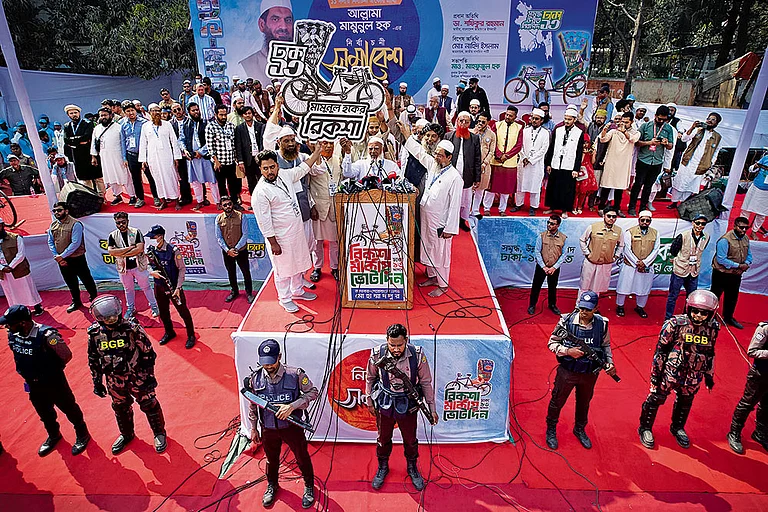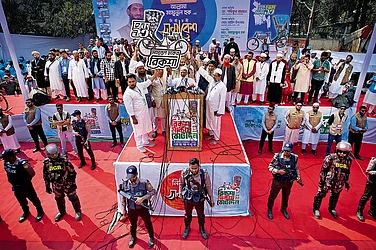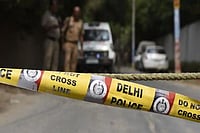The last couple of months in Pakistan have been tumultuous. As of April 11, Pakistan has had a new government after Imran Khan was forced out of power via a vote of no confidence. The weeks leading up to the vote, from the filing of the motion on March 8 to the consistent rallies, have been dramatic and full of intrigue.
The opposition party in Pakistan had been clamouring for the fall of Imran Khan’s Pakistan Tehreek-e-Insaf (PTI) for a long time. He was perceived as a “military”-voted leader, as opposed to “elected”. The opposition formed an alliance in the fall of 2020, the Pakistan Democratic Movement (PDM). And recently the movement gained traction.
Khan came to power in 2018, promising to break the pattern of family rule in Pakistan, but his opponents said he was elected with help from the powerful military, which has ruled the country for half of its 75-year history.
March
On March 8, Pakistan's Opposition leaders submit a no-confidence motion against PM Imran Khan, accusing his government of uncontrolled inflation.
On March 19, Khan's party issued show-cause notices to dissident PTI lawmakers.
On the following day, the Speaker summoned the National Assembly session on March 25 to take up a no-trust motion against PM Khan.
On March 23, PM Khan said that he will not resign as three allies indicate to vote against his government and on March 25, Pakistan’s National Assembly session adjourned without tabling of the no-trust motion against PM Khan.
At a massive rally on March 27, PM Khan claimed foreign powers were behind a ‘conspiracy’ to overthrow his government.
On March 28 PML-N president Shehbaz Sharif tabled a no-trust motion against PM Khan in the National Assembly.
PM Khan lost the majority on March 30 after key allies sided with the Opposition ahead of the no-trust vote.
On March 31 the Pakistan Parliament met to debate the no-trust motion against PM Khan.
April
In the first week of April, PM Khan claimed that his life was in danger and asserted that he was not afraid and would continue his fight for an independent and democratic Pakistan.
Deputy Speaker Qasim Suri blocked the no-trust motion against PM Khan and on April 3, PM Khan advised President Arif Alvi to dissolve the National Assembly which the President obliged the same day.
On April 11, Pakistan’s parliament elected opposition lawmaker Shahbaz Sharif as the new prime minister, following a week of political turmoil that led to the weekend ouster of Imran Khan.
Sharif, the brother of disgraced former Prime Minister Nawaz Sharif, won with 174 votes after more than 100 lawmakers from Khan’s PTI, or Pakistan Justice Party, resigned and walked out of the National Assembly in protest.
On the night of April 10, Khan rallied hundreds of thousands of supporters in protests, describing the new leadership as an “imposed government” that colluded with the US to oust him. His backers marched in cities across Pakistan, waving large party flags and shouting slogans promising to return him to power. The crowds were dominated by youths who make up the backbone of Khan’s supporters.
May
On May 26, Khan warned the government to stage fresh elections or face more mass protests, after leading thousands of supporters to Islamabad in a showdown with his political rivals. The announcement followed 24 hours of chaos after Khan’s supporters clashed with the police and blocked roads across Pakistan.
On the same day, Pakistan's National Assembly passed a bill to abolish the former Imran Khan government's election reforms giving expats the right to vote through I-Voting and the use of electronic voting machines (EVMs) in the country.
The Elections (Amendment) Bill 2022 presented by Parliamentary Affairs Minister Murtaza Javed Abbasi was passed with a majority vote in the lower house, with only members of the Grand Democratic Alliance (GDA) opposing it.
June
In the first week of June, fresh allegations floated that Khan, his wife Bushra Bibi and her friend Farah Gogi made "billions" under the tenure of the PTI government.
Addressing a press conference, PML-N leader Atta Ullah Tarar said, "It started in 2019, when Imran Khan gave a relief worth Pakistani rupees 320 million to Ahsan Jamil Gujjar - Farah's husband - under an amnesty scheme.”
July
On July 5, Pakistan's Chief of the Army Staff (COAS) General Qamar Javed Bajwa directed the country's commanders and other key officers, including those associated with the ISI, to stay away from politics and avoid interacting with politicians.
On July 27, Pakistan's top court ruled to hand control of the country's most populous province, Punjab, to a candidate backed by ousted Khan. The move triggered fresh political uncertainty in the South Asian nation amidst a crippling economic crisis.
August
On August 22, Khan accused the government of temporarily blocking YouTube in the country the previous evening to prevent people from listening live to a speech he gave at a political rally.
Pakistan's electronic media regulator late August 20 announced a ban on the live airing of Khan's speeches because of what it called his "hate speech" against state institutions.
Taking to Twitter, Khan said, "Imported govt blocked YouTube midway through my speech.”
Around the same time, the PTI chief was booked in a terrorism case on the complaint of Islamabad Saddar Magistrate Ali Javed for allegedly threatening the additional sessions judge of the federal capital, Zeba Chaudhry.
Following the charges, his supporters assembled near his residence in a bid to protect their leader from arrest after he was charged under the country’s anti-terror laws.
Meanwhile, the ousted prime minister has been leading rallies across the country attacking the government’s legitimacy and calling for fresh elections.
(With inputs from agencies)


























